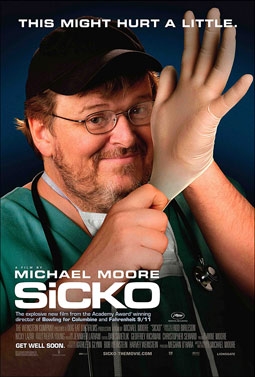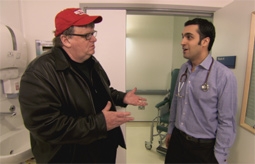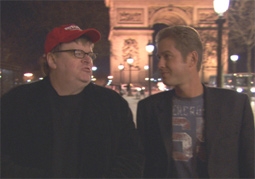


A big fan of Bowling for Columbine and Fahrenheit 9/11, I anxiously awaited the opportunity to attend a screening of Sicko, the documentation of Michael Moore's latest target - the American Healthcare System. In usual Michael Moore fashion, the film starts out with emotional images of two men who are without health insurance: one man is seen stitching up his own knee at home; the other man is missing the top of his middle finger, as he could only afford to re-attach the top of his ring finger, after an accident sliced them both off. Michael Moore's voiceover introducing these two men is a mix of sympathy and sarcasm. Sarcasm not pointed at the subjects in his film, but an expression of rage directed towards a system where 50 million Americans are without health insurance in the wealthiest country on earth. He then goes on to explain in this opening voiceover, that it is not the uninsured that he wishes to focus on in Sicko, but rather the victimization of the 250 million trusting Americans who do have health insurance, and who dutifully pay their premiums month after month, assuming that in their time of need, their in insurance provider will be there for them. As we learn amidst this harrowing journey of personal tales from both people who were denied the proper coverage by their health insurance company, as well as guilt ridden confessions of both present and former insurance company employees, this is not the case. And surprise, surprise… HMOs are the worst offenders. As a PPO insured American, I couldn't help but feel thankful at my privilege of being able to see specialists without a referral, and that my claims are only denied once in a while, when my insurance provider is having a really bad day. 8 times out of 10, I'm ahead of the game. Shouldn't it be 10 out of 10… for everyone?
While this is, in fact, a movie review, I feel somewhat compelled to also review our healthcare system and the insurance companies who have it in a chokehold. This irresistible urge on my part is a strong testament to the message of the film that Michael Moore had hoped to get across. As Sicko unfolds, we hear families recount how their insurance companies pulled the rug out from under them, deeming necessary procedures and medication to be "experimental." In one young girl's case, her insurance company refused to pay for a second cochlear implant, leaving her deaf in one ear. Upon receiving a letter from her father stating that he would be telling his story to filmmaker Michael Moore, the insurance company suddenly had a change of heart and decided to spring for the child's second cochlear implant. Another man was not so lucky. Suffering from terminal cancer and in dire need of a bone marrow transplant and medication, his insurance company denied his claims and desperate pleas, falling back on one of their favorite words, "experimental." The man died a few weeks later, leaving behind a loving wife and child.
Recognizing that the word "socialized" is taboo in the United States, Michael Moore decides to take his cameras to some other countries where healthcare is universal, to see just how it works and why we don't have it here. His first stop was right across the border in Canada, where Michael Moore first met up with two of his relatives who happen to reside north of the border. They expressed trepidation in coming to the states for even one day without medical coverage, for fear of having an accident or falling ill during a visit, and being slapped with an exorbitant hospital bill that they can't afford to pay. As a result, they won't set foot on American soil without health insurance. Moore then spoke to another Canadian gentleman who was playing a leisurely game of golf. He expressed the same concerns regarding a non-insured visit to the United States. When asked by Moore why Canadians have universal free healthcare, the man replied, "The ones who have need to look after the ones who don't. We take care of each other." Moore then went on to make a valid point that many Americans have not stopped to consider. We treat socialism as a dirty word in the states but we do engage in socialism. We have socialized education, socialized police and firefighters and socialized road maintenance. Those basic services are paid for out of our tax dollars and are provided to us, free of charge. After all, that's not where the big money is. Sickness is big business in America, and health insurance companies and pharmaceutical companies are cashing in with deductibles, high premiums and heavily marked up drugs that are virtually unaffordable to the average American. Moore then throws in a vintage clip where former President Richard Nixon is meeting with his aide, John Ehrlichman, who says, "Well, this is how it's going to work, these HMOs. They're going to make more money by providing less care. The less care they give them, the patients, the more money the company makes." Nixon replies, "Oh, not bad." According to Sicko, to maximize profits, insurance company executives are expected to deny a certain percentage of claims every month, no matter how legitimate the claims may be. In fact, they are rewarded with bonuses and promotions for doing so, as told to Moore in some very candid interviews with former insurance company employees.


One clip that I found especially poignant was footage of Dr. Linda Peeno, a physician and former employee of the Humana HMO. She testified to famously denying a man a necessary heart transplant, thus leading to his subsequent death, yet saving Humana $500,000. In the movie, Damaged Care, which chronicles Dr. Linda Peeno's experiences (starring actress Laura Dern), after denying a deserving Humana customer his necessary heart transplant, she then witnesses the company building a tremendous fountain in their lobby. When Dr. Peeno (played by Dern) inquires about the cost of the fountain in Damaged Care she is told that the cost of the fountain is coincidentally, $500,000.
Moore shoots a good part of the second half of Sicko abroad in England and France, where he explores their healthcare systems. While in England, Moore interviews physicians working in England's socialized healthcare system, as well as a government official and some British citizens. When he sees a couple being discharged from the hospital with a newborn baby, Moore asks, "How much did that baby cost?" Their response was, "Nothing. This isn't America." It seems the fact that we pay for our healthcare, and the idea of new parents paying to have their baby, is somewhat of a laughing stock in other counties. When Moore attempts to play devil's advocate and grills a London based physician about the ills of working for the government as opposed to working privately, the doctor explains that his sole focus is to help people to get well, not on money. He is paid a healthy sum by the government which affords his family a luxury car and home that cost him the equivalent of one million American dollars. He further explains that in England, the government provides doctors with bonuses for keeping patients healthy. The healthier the patients, the more they get rewarded. The more they engage in the practice of preventative medicine with their patients, the better they do financially. What a concept! In France we see how patience are encouraged to stay in the hospital as long as they need in order to properly recuperate and heal. There is no limit that is contingent to what your insurance company is willing to pay for. It simply doesn't exist. In stark contrast, we watch an elderly woman get literally kicked to the curb from a Los Angeles hospital due to lack of insurance. As this shocking scene unfolds, a resident doctor of the hospital admits that kicking people out onto the street for lack of insurance is not an uncommon practice at their hospital.

Perhaps the biggest insult that was exposed in Sicko, was a group of 9/11 volunteer rescue workers, suffering from various residual ailments, who cannot get the care they desperately need, due to uncooperative HMOs and unsympathetic government officials. In a move clearly orchestrated for theatrical affect, Moore assembles these former volunteer workers and takes them on a boat to Guantanamo Bay Detention Camp where our federal detainees and terrorism suspects are held, and where ironically, every detainee is provided with free quality healthcare. Moore, with bullhorn in hand, declares, "We just want the same healthcare that the evil-doers are getting." After his cries are ignored (as he knew they would be ahead of time), the group heads over to Cuba, where some Cuban doctors heroically provide treatment for the bunch, at no cost.
Though Moore has a tendency to heighten his messages by playing on emotions as opposed to intellect, he does provide adequate facts and statistics to justify the emotional manipulation, thus making it a fair and balanced piece. Though Moore is notoriously accused of one-sided editing in all of his films, all of the editing in the world can't change some of the gruesome truths that Sicko uncovers.
Sicko
Rated PG 13 - includes some disturbing images. Runtime 113 min. Theatrical
Release 6/29/2007.
PR.com Rating: A
